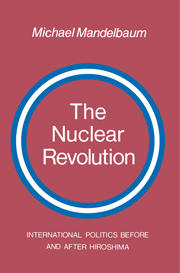Book contents
- Frontmatter
- Contents
- Preface
- 1 The nuclear revolution
- 2 Nuclear weapons and chemical and biological weapons
- 3 The balance of power in the nuclear age
- 4 Arms competition: The nuclear arms race and the Anglo–German naval rivalry
- 5 Arms competition: The nuclear arms race and tariff competitions
- 6 NATO: The nuclear alliance
- 7 The nuclear presidency
- 8 The bomb, dread, and eternity
- Notes
- Index
8 - The bomb, dread, and eternity
Published online by Cambridge University Press: 26 January 2010
- Frontmatter
- Contents
- Preface
- 1 The nuclear revolution
- 2 Nuclear weapons and chemical and biological weapons
- 3 The balance of power in the nuclear age
- 4 Arms competition: The nuclear arms race and the Anglo–German naval rivalry
- 5 Arms competition: The nuclear arms race and tariff competitions
- 6 NATO: The nuclear alliance
- 7 The nuclear presidency
- 8 The bomb, dread, and eternity
- Notes
- Index
Summary
Nuclear annihilation
After the first battles of the Peloponnesian War, as Thucydides tells it, the Athenians assembled to honor their dead. Pericles was chosen to address the public funeral. His speech was a tribute to Athens, praising the city's political institutions and the spirit of its people. The greatness of Athens, he argued, was both the reason and the justification for the deaths of those who fell in its defense. “This, then, is the kind of city for which these men, who could not bear the thought of losing her, nobly fought and nobly died. It is only natural that every one of us who survives them should be willing to undergo hardships in her service.”
Death, and the threat of death, are the central experiences of war. All societies have formal ways of recognizing and coming to terms with it. Some way, after all, is needed to persuade men to risk their lives in battle; Pericles plainly had this in mind. It is not, however, simply death in war that societies recognize. Ceremonies and doctrines that provide some cultural context for death are universal features of organized social existence. Their purpose is to emphasize what continues even as an individual life ends; they connect death to life.
The need for “symbolic immortality” seems to be basic to human beings. It can be achieved in biological terms, through a family; it can be achieved in cultural terms, through individual works like books, buildings, or businesses; it can be achieved in social terms, through membership in a group. In each case the person contributes to something of value that survives him.
- Type
- Chapter
- Information
- The Nuclear RevolutionInternational politics Before and after Hiroshima, pp. 207 - 230Publisher: Cambridge University PressPrint publication year: 1981



